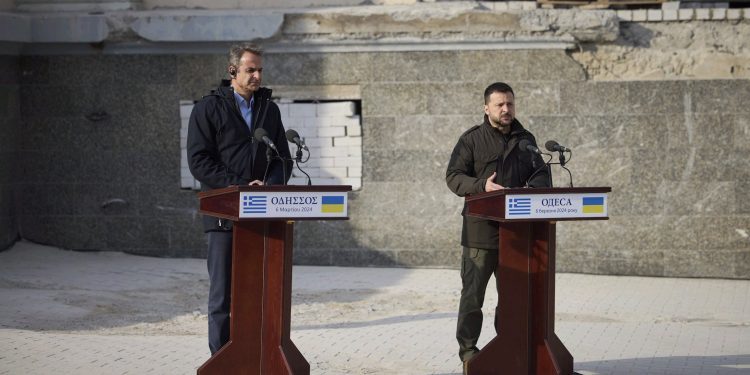Russia bombarded the Black Sea port city of Odesa during a meeting between Ukrainian President Volodymyr Zelensky and the prime minister of Greece — and the missile landed within earshot of the two leaders.
“We had explosions very close to us,” Greek Prime Minister Kyriakos Mitsotakis told reporters.
The missile exploded approximately 650 feet from their location, according to Greek media outlets. The attack left five people dead and stoked speculation that the strike had been an attempt to kill Zelensky, at the risk also of endangering the leader of a NATO ally.
“We cannot rule out that there might have been an attempt on the president’s life,” Oleksandr Merezhko, the chairman of the Ukrainian parliament’s foreign affairs committee, told the Washington Examiner. “Usually, we don’t hear about escalation or attempts like this because the Russians have been very careful. They understand that if they create danger for Western leaders, it will have a backlash, and the sanctions will be stronger.”
The bombardment drew a furious response from the European Union, whose top official condemned the “vile attack” as an intimidation tactic.
“No one is intimidated by this new attempt at terror – certainly not the two leaders on the ground nor the brave people of Ukraine,” European Commission President Ursula von der Leyen wrote on social media. “More than ever, we stand by Ukraine.”
Mitsotakis and Zelensky met in Odesa and toured an apartment building where 12 people died on Saturday in a missile strike. They chose Odesa in part because the city has historical significance for Greece — the architects of the Greek War of Independence from the Ottoman Empire met in the port city to plan their uprising.
“We saw this attack today,” Zelensky said, per a Ukrainian outlet’s translation. “You can see who we are dealing with, they don’t care where they hit. I know that there were casualties today, I don’t know all the details yet, but I know that there are people who were killed and wounded.”
Merezhko acknowledged that it is not clear if the strike was an overt attempt to assassinate the Ukrainian president or just another strike against Odesa. The difficulty lies in assessing whether Russian forces knew the two leaders were in the city, so close to the scene of the bombing, as Zelensky and Mitsotakis attempted to keep the preparations for their meeting a secret prior to their public appearance in the city.
“We cannot rule out that [Russia] might have known about this visit because sometimes, the organization of such visits are difficult to hide completely,” Merezhko said. “I got the impression that they have been careful about such attempts, but here they sort of crossed the red line. They didn’t care about the presence of the Greek [prime minister] … they were ready to take this risk and to cause frustration and backlash in the West in the European Union by trying to kill [the] Ukrainian president. So it’s only my personal, subjective hypothesis about this, but this is outrageous.”
Mitsotakis said the strike underscored the lessons that Western leaders learn when visiting Ukraine.
“I think this is the best, most vivid reminder for us that there is a real war going on here,” the Greek leader said, according to an unofficial translation of a transcript published by his office. “Every day there is a war, which does not only affect the front, the soldiers. And I think that’s one more reason why all European leaders should come to Ukraine. Because it’s different to see, to hear the description from the media or from President Zelensky with whom we communicate regularly and are completely different.”






